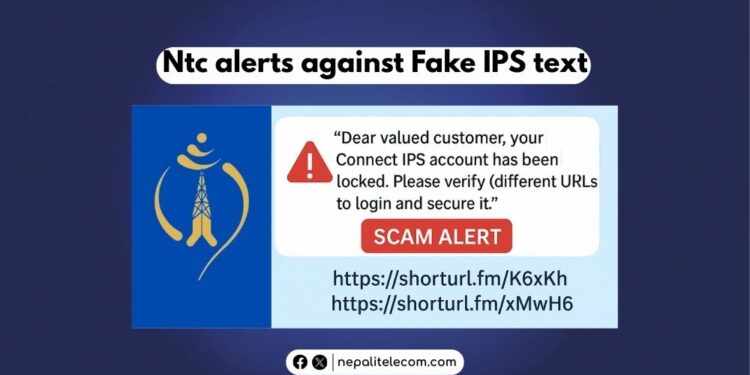- Nepal Telecom warned customers of fraudulent SMS claiming Connect IPS account lock, containing malicious links.
- Messages redirect to fake login pages to steal usernames and passwords, potentially causing financial loss.
- Nepal Telecom advises ignoring such messages, verifying information via official channels, and practicing safe online habits.
Nepal Telecom issues a public notification alerting customer about getting fraud messages for Connect IPS via several Alert IDs. Ntc warns you to be safe if you have got such fake messages.
As per the company, several subscribers have reported of receiving suspicious SMS containing malicious links. The SMS was of the format; ““Dear valued customer, your Connect IPS account has been locked. Please verify (different URL addresses) to login and secure it.”
Do read: 40% Nepali do not use SIM cards on their own name
The company also further states that the message if clicked redirects to fake pages prompting to enter your Connect IPS username and password. So, Ntc urges customers not to click such malicious links that could lead to financial loss. Further there is a chance that they could even use your identify for some other purposes.
Some of the sample URLs were like https://shorturl.fm/…. that were shortened for this fraudulent purpose.
Also, Nepal Telecom reiterates to follow official verified social media handles like fb page with blue tick for trusty information and updates. Likewise, the company advises you to be cautious and ignore such fake messages to protect yourself from online scams and mobile frauds.
Our Opinion on Such online scamming
Phishing and online fraud are rising rapidly. Scammers are taking advantage of growing internet access and low digital literacy. This trend is alarming and puts both safety and financial security at risk. Issues like SIM swap scam, fake vacancy, Wangiri one ring scam etc keep on coming to trouble people.
Banks, telecom operators, regulators, and all digital service providers (stakeholders) must act together in coherence. They should raise awareness and educate people about common fraud tactics. Strong security systems, regular alerts, and awareness campaigns can help protect users.
Users also need to stay alert. Always check the authenticity of links before clicking. Never share sensitive details like usernames, passwords, or bank information through unknown or suspicious channels. Staying cautious is the best defense against online scams.
Don’t miss: How to secure yourself from threats? Best cyber security practices












